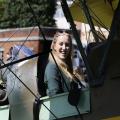
A HERD of llamas in Reading could hold the key to curing Covid-19, according to new research.
The woolly animals produce incredibly tiny antibodies that latch onto the virus' potentially deadly 'spikes'.
Lab experiments on human cells found they prevented infection. Clinical trials are now being planned.
ALSO READ: In the Dock: Results from court
Study corresponding author Professor James Naismith, of Oxford University, said: "These nano-bodies have the potential to be used in a similar way to convalescent serum - effectively stopping progression of the virus in patients who are ill."
Antibodies are weapons of the immune system and that stick to proteins on the surface of harmful invaders.
But ours are much bigger - meaning they can only attack the tips. Those of llamas, camels and alpacas use their size advantage to wriggle much deeper.
There is currently no treatment for Covid-19. Proteins on its surface look like spikes that hook onto a locking point on human cells to insert its genetic material.
Once inside it hijacks the healthy machinery of the nucleus to make multiple copies of itself. They burst out of the cell destroying it - and then infecting others.
Most people's immune system mounts a response. But in some it goes into overdrive and starts attacking the lungs and other organs - which can prove fatal.
Transfusions of blood from recovering individuals - which contain human antibodies against the virus - has been shown to save the lives of critically ill patients.
Known as 'passive immunisation', it's been used for over a century. But it's not straightforward to identify those with the right antibodies - and is not always safe.
ALSO READ: Should we be wearing face masks in shops? We want your thoughts
A lab-based product made on demand would have considerable advantages - and could be used earlier in the disease where it is likely to be more effective.
The British team identified two nano-bodies - named H11-H4 and H11-D4 - derived from llamas that neutralised Covid-19.
It did this by blocking its interaction with a protein in human cells called ACE2, reports Nature Structural and Molecular Biology.
Nano-bodies are small, stable and easily produced. They often serve as alternatives to conventional antibodies for diagnostics and imaging.
Specifically, H11-H4 was especially potent and efficient in combating the virus.
Prof Naismith, a structural biologist at the Rosalind Franklin Institute, Didcot, said: "We were able to combine one of the nano-bodies with a human antibody and show the combination was even more powerful than either alone.
"Combinations are particularly useful since the virus has to change multiple things at the same time to escape; this is very hard for the virus to do. The nanobodies also have potential as a powerful diagnostic."
ALSO READ: Trial date set for terror suspect over Forbury Gardens attack
The herd of llamas being investigated for the study is kept on a farm at Reading University.
Prof Naismith and colleagues are now screening antibodies from Fifi - one of the 'Franklin llamas' - taken after she was immunised with harmless virus proteins.
Her immune system has produced different antibodies from those already identified in a library database.
This will enable cocktails of nano-bodies to be tested against the virus, said Prof Naismith.
Dr Andrew Bourne, RFI project director, said: "These exciting research outcomes have the clear potential to be developed as part of the treatment regime for those most severely affected by Covid-19.
"It illustrates how collaboration across the UK's world-class research and innovation community is helping to tackle the threat of Covid-19 and other healthcare challenges."
Last year the first llama produced drug for treating a rare blood disorder was launched.
There are also hopes of using the creature to create therapies for dementia and cancer.
Prof Naismith added: "2020 marks the centenary of Franklin's birth.
"As an institute named for a pioneer of biological imaging, we are proud to follow in her footsteps and continue her work in viruses, applied here to an unprecedented global pandemic.
"Franklin's work transformed biology, and our projects aspire to that same transformational effect."



Comments: Our rules
We want our comments to be a lively and valuable part of our community - a place where readers can debate and engage with the most important local issues. The ability to comment on our stories is a privilege, not a right, however, and that privilege may be withdrawn if it is abused or misused.
Please report any comments that break our rules.
Read the rules here